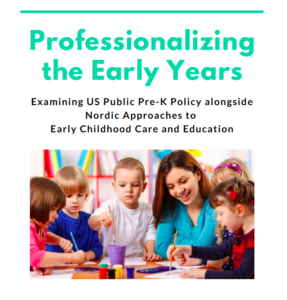Portfolio Item 2: International ECE Professionalization Comparative Policy Brief
Link to the “Professionalizing the Early Years” Policy Brief (PDF)
About the “Professionalizing the Early Years” Policy Brief
Developing the comparative policy brief on the topic of early childhood care and education (ECCE) in Nordic countries and the United States was a challenging process, which originated in the development of a lengthier academic policy analysis on the same topic. Condensing the research on these multi-faceted issues (including the benefits of ECCE, defining professionalization, and structural differences between education systems across contexts) proved a difficult but worthwhile process. While reframing the discussion of these complex topics in a  modern, consumer-friendly way, I was able to refine my own understanding of the issues as I synthesized the information. Determining what to include also forced me to make critical decisions regarding the most concise and cohesive, yet still nuanced, way to present information to a much different audience. In this way, I learned the valuable skill of framing topics and providing context to make information accessible to diverse audiences.
modern, consumer-friendly way, I was able to refine my own understanding of the issues as I synthesized the information. Determining what to include also forced me to make critical decisions regarding the most concise and cohesive, yet still nuanced, way to present information to a much different audience. In this way, I learned the valuable skill of framing topics and providing context to make information accessible to diverse audiences.
This project continues to highlight my interest in critical topics related to ECCE, but rather than a micro-level perspective of a specific regional workforce, as was captured in my first portfolio artifact, here I captured my interest in broader policy and theoretical questions related to the professional status of early childhood educators. In this policy brief, I was able to integrate questions of a definition of function and quality of ECCE, raising concerns regarding the “academization” of the early years of learning in the U.S. context. This topic is of deep interest to me from both a theoretical perspective (i.e. what value do we place on the present developmental stage and abilities of young children versus their future potential economic outputs?) and a practical perspective (i.e. how should early childhood educators choose their curricula and organize their classrooms?). Through researching this topic, I gained both theoretical knowledge and practical recommendations from expert sources in the field, which enriched my understanding and deepened my interest in the topic.
Ultimately, this project highlights the intersection of several different skills and interests of mine. Not only did I have the opportunity to think critically about making cross-contextually informed policy recommendations, but I also had the chance to braid multiple strands of my interests into one project, merging the practical and the theoretical, and communicating information in a relevant and concise manner. I also considered how to visualize the report in an appealing and engaging way using the Canva online design software. In future settings, I look forward to developing my ability to dive deep into complex policy issues in the ECCE field, as well as my skillsets in communicating those findings across multiple audiences and advocating for meaningful action in response to them.